Midweek Review
Arisen Ahubudu – Epitome of greatness
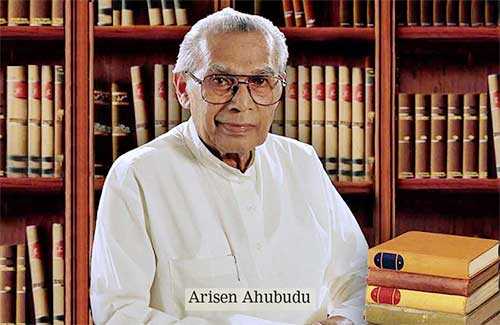
Commemorating the 100th Birth Anniversary nonpareil scholar cum educator
By S.V.D. Kesarralal Gunasekera
He was my teacher 51 long years ago, but what he taught us is etched in my mind. That is why it is such an honour for me to write about him and the influence he had on generations of Thomians.
Clad in immaculate national dress and small in stature, he was a Sinhala scholar, Buddhist activist and patriot. During our school days we came across all sorts of teachers. Some were strict; some were firm; some mild and soft-spoken and some were ‘no-nonsense’. Often, all those teachers raised their voice to control the students. Mr. Ahubudu had his own style of bringing the class to attention. He did not need any words or sounds or even gestures. I recall how he would walk into our classroom. No sooner had he entered the classroom than all students became silent. We were ready to receive him. For a teacher to receive such acceptance is incredible. One can imagine how boisterous a class of young Thomians would have been. But he commanded our respect and attention because of his unique style of teaching. And his influence has lasted over fifty years.
Commitment to educate
Looking back, I realise that he believed his duty was to impart knowledge. He made every attempt to teach everything he knew. He knew teaching had to be interesting as well as entertaining. He used creative methods. What the present-day development theorists call ‘edutainment’ is exactly what Mr. Ahubudu practiced decades ago. He knew that kindling interest of the student was tantamount to completing 75% of teaching; the remaining 25% was the imparting of the information.
As soon as he greeted us, he would pic up a piece of chalk and draw pictures from one end to the other of the wall-to-wall blackboard. Within minutes he completed the drawing. He was a fabulous artist. His visual aid to the lesson was what he drew on the blackboard. And that was how he kept our attention riveted on the lesson. His dedication to teaching was indeed exceptional. And to think that in this day and age with the availability of technology, teaching materiel and investments made in education, we still worry about the generations of children and what the future holds for them simply because we do not have teachers of Mr. Ahubudu’s calibre.
Teaching a noble service
During the last few decades, we have seen how trade union action has taken its toll on the noble profession of teaching. Teachers have struck work and even refused to evaluate answer scripts. There were numerous occasions where teachers and principals took ‘sick leave’ and neglected their schools and students.
Mr. Ahubudu went beyond and above call of duty. He taught from Grade 7 up to the GCE O/L classes. To me he was like no other. His style of teaching was what we call ‘out-of-the-box’ today. The pictures he drew included figures of kings, stupas, etc. With them, he got us interested in his lessons. His illustrations were lively and intriguing. Then he would relate the story pertaining to the drawing. Most often the stories were about a king or a historical event He told us about kings such as Dutugemunu and Dhatusena and their service to the country, religion and the people. His stories also included ancient cultivation practices, irrigation and the extraordinary commitment of the leaders of our country. The stories which lasted for about six to seven minutes touched our minds and hearts, creating a deep sense of affection for our language, culture and country.
‘Respect the Dead’
I distinctly remember how he narrated the story about the final confrontation between Kings Elara and Dutugemunu. The story did not end with King Elara being defeated. He carefully narrated what happened thereafter; how King Dutugemunu decreed that anyone passing the tomb of the Late King Elara should pay respect to it.
He stressed that the greatness of King Dutugemunu was this action and not defeating of his rival as such. Today, we are debating in Parliament whether the final rites of the Muslims who die of COVID-19 should be allowed to be performed according Islam. Today, we bring in court orders disallowing Tamils to remember their loved ones who died in war. We as a nation have forgotten to respect the dead. But those of us who were fortunate enough to be taught by Mr. Ahubudu have no difficulty in respecting the dead.
Patriotism not racism
For us, the inculcation of the virtues of unity began at STC. Mr. Ahubudu was the one who sowed the very first seeds of patriotism in our minds. Our forefathers who were the main characters of the stories he narrated always placed country before self in whatever they did—going to war, building stupas, trading with other countries or constructing irrigation systems. He was able to strike that fine balance in his stories by highlighting the exemplary traits of those heroes and heroines and not just giving a false sense of pride of being Sinhalese.
Even when he told us stories about our fight against the British Empire, he left no room for anger or animosity. He knew his audience was a bunch of boys of a very impressionable age. So, he was careful not to allow us to misconceive the idea of nationalism. He also introduced the concept of farming for self-sustenance to us. That was the time that Mrs. Sirimavo Bandaranaike’s government had launched a national cultivation drive, and Mr. Ahubudu’s contribution to it was immense. He made us understand the importance of agriculture and taught us to love and respect the farmer. In the same manner, our college was full of students from all ethnicities and there was no trace of racism.
Wealth of knowledge
I can still recite many Pali and Sanskrit stanzas effortlessly thanks to Mr. Ahubudu. At some meetings when I recite these to the surprise of my colleagues.
Today, a teacher will not go beyond the subject matter in teaching his or students for two reasons; one is that his or her knowledge is limited, and the other is that he or she does not care about their students and the need to impart a wholesome education.
Whenever Mr. Ahubudu taught something extra it was made very interesting to us. It was his guidance which helped many of us today to move with people from all walks of life.
Disciplinarian
I have been guided by many disciplinarians in my life. But none was gentler than Mr. Ahubudu. I still wonder how he commanded attention and respect, kept the students quiet and still won our hearts and minds without ever having to be strict with us. He was a different type of character; affable and soft-spoken but extremely effective as a teacher. He never punished us. He addressed as ‘oba’ (‘you’ in its mildest and most respectful form). There was no need for him to send anyone to the Warden or mete out any punishment himself. The reason was not that we were great students but he was a great teacher.
We hardly see any discipline in this country. Starting from Parliament, what we see is indiscipline, which is tolerated even by the Speaker. We have witnessed interruptions, disruption and even the destruction of public property at times in the House. There is a myth that only the military in this country has discipline and its members should be appointed in every field to instill ‘discipline’. If discipline means merely obeying orders, then that measure makes sense. But we need teachers as well as leaders who could inculcate human values such as integrity, honesty and self-respect. We therefore need teachers like Mr. Ahubudu.
Worthy Citizens
What Mr. Ahubudu did was preparing us to become worthy citizens. Never did he tell us to become doctors, lawyers or engineers. He wanted us to be good citizens. He wanted us to do better than he. He was always punctual. It was his way of respecting others and also being an example to others. Sadly, as for many present-day teachers it is the other way around. The present-day generation is in dire need of teachers of the calibre of Mr. Ahubudu. We do not need teachers who consider their pupils a burden. We need teachers who understand hearts and minds of children.
A lesson for today’s teachers
Undoubtedly, the teachers of today draw good salaries. However, at the time Mr. Ahubudu was in service, salary anomalies or personal benefits never affected schools. There may have been such issues, but teachers brought them up at different fora without letting them affect children’s education, which they considered sacred. Like the health sector, the education sector too was considered noble.
‘Sirs’ on billboards
For additional teaching Mr. Ahubudu never charged a single cent extra. Teachers of yesteryear never worked for money. They believed in imparting knowledge and moulding characters of their students. In the case of Mr. Arisen Ahubudu, he came into this world to teach. And he did an excellent job of it.
Today, there are many ‘sirs’ advertising themselves as experts in their respective fields to make money. The Sri Lankan education system promotes private tuition in such a way that it has become an unregulated business. Parliament is not interested in introducing any regulations for private tuition.
I think that someone helping students on a one-to-one basis for a short period could be considered private tuition, but what we have today are huge private tuition centres that cater to thousands of students in one go. This, we see in a country where even a school classroom with 45 students is considered overcrowded!
It is indeed an honour to appreciate a teacher who lived a simple but exemplary life. For all the teaching and guidance he has given us, I cannot thank him enough. This nonpareil educator made our childhood and school life memorable and colourful.
May he attain the supreme bliss of Nibbana!
- News Advertiesment
See Kapruka’s top selling online shopping categories such as Toys, Grocery, Flowers, Birthday Cakes, Fruits, Chocolates, Clothing and Electronics. Also see Kapruka’s unique online services such as Money Remittence,News, Courier/Delivery, Food Delivery and over 700 top brands. Also get products from Amazon & Ebay via Kapruka Gloabal Shop into Sri Lanka.
Midweek Review
‘Professor of English Language Teaching’
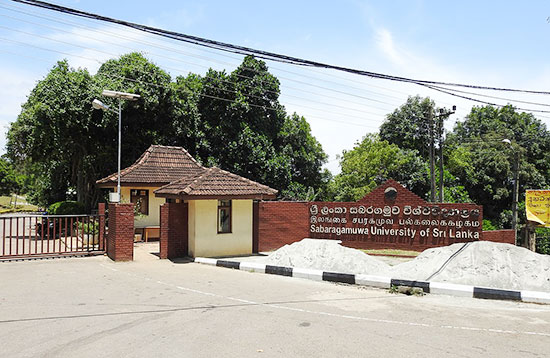
It is a pleasure to be here today, when the University resumes postgraduate work in English and Education which we first embarked on over 20 years ago. The presence of a Professor on English Language Teaching from Kelaniya makes clear that the concept has now been mainstreamed, which is a cause for great satisfaction.
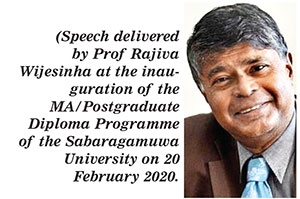 Twenty years ago, this was not the case. Our initiative was looked at askance, as indeed was the initiative which Prof. Arjuna Aluwihare engaged in as UGC Chairman to make degrees in English more widely available. Those were the days in which the three established Departments of English in the University system, at Peradeniya and Kelaniya and Colombo, were unbelievably conservative. Their contempt for his efforts made him turn to Sri Jayewardenepura, which did not even have a Department of English then and only offered it as one amongst three subjects for a General Degree.
Twenty years ago, this was not the case. Our initiative was looked at askance, as indeed was the initiative which Prof. Arjuna Aluwihare engaged in as UGC Chairman to make degrees in English more widely available. Those were the days in which the three established Departments of English in the University system, at Peradeniya and Kelaniya and Colombo, were unbelievably conservative. Their contempt for his efforts made him turn to Sri Jayewardenepura, which did not even have a Department of English then and only offered it as one amongst three subjects for a General Degree.
Ironically, the most dogmatic defence of this exclusivity came from Colombo, where the pioneer in English teaching had been Prof. Chitra Wickramasuriya, whose expertise was, in fact, in English teaching. But her successor, when I tried to suggest reforms, told me proudly that their graduates could go on to do postgraduate degrees at Cambridge. I suppose that, for generations brought up on idolization of E. F. C. Ludowyke, that was the acme of intellectual achievement.
I should note that the sort of idealization of Ludowyke, the then academic establishment engaged in was unfair to a very broadminded man. It was the Kelaniya establishment that claimed that he ‘maintained high standards, but was rarefied and Eurocentric and had an inhibiting effect on creative writing’. This was quite preposterous coming from someone who removed all Sri Lankan and other post-colonial writing from an Advanced Level English syllabus. That syllabus, I should mention, began with Jacobean poetry about the cherry-cheeked charms of Englishwomen. And such a characterization of Ludowyke totally ignored his roots in Sri Lanka, his work in drama which helped Sarachchandra so much, and his writing including ‘Those Long Afternoons’, which I am delighted that a former Sabaragamuwa student, C K Jayanetti, hopes to resurrect.
I have gone at some length into the situation in the nineties because I notice that your syllabus includes in the very first semester study of ‘Paradigms in Sri Lankan English Education’. This is an excellent idea, something which we did not have in our long-ago syllabus. But that was perhaps understandable since there was little to study then except a history of increasing exclusivity, and a betrayal of the excuse for getting the additional funding those English Departments received. They claimed to be developing teachers of English for the nation; complete nonsense, since those who were knowledgeable about cherries ripening in a face were not likely to move to rural areas in Sri Lanka to teach English. It was left to the products of Aluwihare’s initiative to undertake that task.
Another absurdity of that period, which seems so far away now, was resistance to training for teaching within the university system. When I restarted English medium education in the state system in Sri Lanka, in 2001, and realized what an uphill struggle it was to find competent teachers, I wrote to all the universities asking that they introduce modules in teacher training. I met condign refusal from all except, I should note with continuing gratitude, from the University of Sri Jayewardenepura, where Paru Nagasunderam introduced it for the external degree. When I started that degree, I had taken a leaf out of Kelaniya’s book and, in addition to English Literature and English Language, taught as two separate subjects given the language development needs of students, made the third subject Classics. But in time I realized that was not at all useful. Thankfully, that left a hole which ELT filled admirably at the turn of the century.
The title of your keynote speaker today, Professor of English Language Teaching, is clear evidence of how far we have come from those distant days, and how thankful we should be that a new generation of practical academics such as her and Dinali Fernando at Kelaniya, Chitra Jayatilleke and Madhubhashini Ratnayake at USJP and the lively lot at the Postgraduate Institute of English at the Open University are now making the running. I hope Sabaragamuwa under its current team will once again take its former place at the forefront of innovation.
To get back to your curriculum, I have been asked to teach for the paper on Advanced Reading and Writing in English. I worried about this at first since it is a very long time since I have taught, and I feel the old energy and enthusiasm are rapidly fading. But having seen the care with which the syllabus has been designed, I thought I should try to revive my flagging capabilities.
However, I have suggested that the university prescribe a textbook for this course since I think it is essential, if the rounded reading prescribed is to be done, that students should have ready access to a range of material. One of the reasons I began while at the British Council an intensive programme of publications was that students did not read round their texts. If a novel was prescribed, they read that novel and nothing more. If particular poems were prescribed, they read those poems and nothing more. This was especially damaging in the latter case since the more one read of any poet the more one understood what he was expressing.
Though given the short notice I could not prepare anything, I remembered a series of school textbooks I had been asked to prepare about 15 years ago by International Book House for what were termed international schools offering the local syllabus in the English medium. Obviously, the appalling textbooks produced by the Ministry of Education in those days for the rather primitive English syllabus were unsuitable for students with more advanced English. So, I put together more sophisticated readers which proved popular. I was heartened too by a very positive review of these by Dinali Fernando, now at Kelaniya, whose approach to students has always been both sympathetic and practical.
I hope then that, in addition to the texts from the book that I will discuss, students will read other texts in the book. In addition to poetry and fiction the book has texts on politics and history and law and international relations, about which one would hope postgraduate students would want some basic understanding.
Similarly, I do hope whoever teaches about Paradigms in English Education will prescribe a textbook so that students will understand more about what has been going on. Unfortunately, there has been little published about this but at least some students will I think benefit from my book on English and Education: In Search of Equity and Excellence? which Godage & Bros brought out in 2016. And then there was Lakmahal Justified: Taking English to the People, which came out in 2018, though that covers other topics too and only particular chapters will be relevant.
The former book is bulky but I believe it is entertaining as well. So, to conclude I will quote from it, to show what should not be done in Education and English. For instance, it is heartening that you are concerned with ‘social integration, co-existence and intercultural harmony’ and that you want to encourage ‘sensitivity towards different cultural and linguistic identities’. But for heaven’s sake do not do it as the NIE did several years ago in exaggerating differences. In those dark days, they produced textbooks which declared that ‘Muslims are better known as heavy eaters and have introduced many tasty dishes to the country. Watalappam and Buriani are some of these dishes. A distinguished feature of the Muslims is that they sit on the floor and eat food from a single plate to show their brotherhood. They eat string hoppers and hoppers for breakfast. They have rice and curry for lunch and dinner.’ The Sinhalese have ‘three hearty meals a day’ and ‘The ladies wear the saree with a difference and it is called the Kandyan saree’. Conversely, the Tamils ‘who live mainly in the northern and eastern provinces … speak the Tamil language with a heavy accent’ and ‘are a close-knit group with a heavy cultural background’’.
And for heaven’s sake do not train teachers by telling them that ‘Still the traditional ‘Transmission’ and the ‘Transaction’ roles are prevalent in the classroom. Due to the adverse standard of the school leavers, it has become necessary to develop the learning-teaching process. In the ‘Transmission’ role, the student is considered as someone who does not know anything and the teacher transmits knowledge to him or her. This inhibits the development of the student.
In the ‘Transaction’ role, the dialogue that the teacher starts with the students is the initial stage of this (whatever this might be). Thereafter, from the teacher to the class and from the class to the teacher, ideas flow and interaction between student-student too starts afterwards and turns into a dialogue. From known to unknown, simple to complex are initiated and for this to happen, the teacher starts questioning.’
And while avoiding such tedious jargon, please make sure their command of the language is better than to produce sentences such as these, or what was seen in an English text, again thankfully several years ago:
Read the story …
Hello! We are going to the zoo. “Do you like to join us” asked Sylvia. “Sorry, I can’t I’m going to the library now. Anyway, have a nice time” bye.
So Syliva went to the zoo with her parents. At the entrance her father bought tickets. First, they went to see the monkeys
She looked at a monkey. It made a funny face and started swinging Sylvia shouted: “He is swinging look now it is hanging from its tail its marvellous”
“Monkey usually do that’
I do hope your students will not hang from their tails as these monkeys do.
Midweek Review
Little known composers of classical super-hits
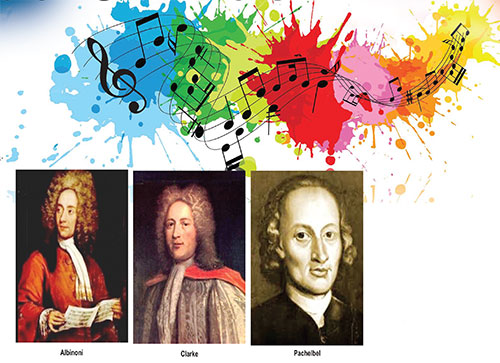
By Satyajith Andradi
Quite understandably, the world of classical music is dominated by the brand images of great composers. It is their compositions that we very often hear. Further, it is their life histories that we get to know. In fact, loads of information associated with great names starting with Beethoven, Bach and Mozart has become second nature to classical music aficionados. The classical music industry, comprising impresarios, music publishers, record companies, broadcasters, critics, and scholars, not to mention composers and performers, is largely responsible for this. However, it so happens that classical music lovers are from time to time pleasantly struck by the irresistible charm and beauty of classical pieces, the origins of which are little known, if not through and through obscure. Intriguingly, most of these musical gems happen to be classical super – hits. This article attempts to present some of these famous pieces and their little-known composers.
Pachelbel’s Canon in D
The highly popular piece known as Pachelbel’s Canon in D constitutes the first part of Johann Pachelbel’s ‘Canon and Gigue in D major for three violins and basso continuo’. The second part of the work, namely the gigue, is rarely performed. Pachelbel was a German organist and composer. He was born in Nuremburg in 1653, and was held in high esteem during his life time. He held many important musical posts including that of organist of the famed St Stephen’s Cathedral in Vienna. He was the teacher of Bach’s elder brother Johann Christoph. Bach held Pachelbel in high regard, and used his compositions as models during his formative years as a composer. Pachelbel died in Nuremburg in 1706.
Pachelbel’s Canon in D is an intricate piece of contrapuntal music. The melodic phrases played by one voice are strictly imitated by the other voices. Whilst the basso continuo constitutes a basso ostinato, the other three voices subject the original tune to tasteful variation. Although the canon was written for three violins and continuo, its immense popularity has resulted in the adoption of the piece to numerous other combinations of instruments. The music is intensely soothing and uplifting. Understandingly, it is widely played at joyous functions such as weddings.
Jeremiah Clarke’s Trumpet Voluntary
The hugely popular piece known as ‘Jeremiah Clarke’s Trumpet Voluntary’ appeared originally as ‘ The Prince of Denmark’s March’ in Jeremiah Clarke’s book ‘ Choice lessons for the Harpsichord and Spinet’, which was published in 1700 ( Michael Kennedy; Oxford Dictionary of Music ). Sometimes, it has also been erroneously attributed to England’s greatest composer Henry Purcell (1659 – 1695 ) and called ‘Purcell’s Trumpet Voluntary (Percy A. Scholes ; Oxford Companion to Music). This brilliant composition is often played at joyous occasions such as weddings and graduation ceremonies. Needless to say, it is a piece of processional music, par excellence. As its name suggests, it is probably best suited for solo trumpet and organ. However, it is often played for different combinations of instruments, with or without solo trumpet. It was composed by the English composer and organist Jeremiah Clarke.
Jeremiah Clarke was born in London in 1670. He was, like his elder contemporary Pachelbel, a musician of great repute during his time, and held important musical posts. He was the organist of London’s St. Paul’s Cathedral and the composer of the Theatre Royal. He died in London in 1707 due to self – inflicted gun – shot injuries, supposedly resulting from a failed love affair.
Albinoni’s Adagio
The full title of the hugely famous piece known as ‘Albinoni’s Adagio’ is ‘Adagio for organ and strings in G minor’. However, due to its enormous popularity, the piece has been arranged for numerous combinations of instruments. It is also rendered as an organ solo. The composition, which epitomizes pathos, is structured as a chaconne with a brooding bass, which reminds of the inevitability and ever presence of death. Nonetheless, there is no trace of despondency in this ethereal music. On the contrary, its intense euphony transcends the feeling of death and calms the soul. The composition has been attributed to the Italian composer Tomaso Albinoni (1671 – 1750), who was a contemporary of Bach and Handel. However, the authorship of the work is shrouded in mystery. Michael Kennedy notes: “The popular Adagio for organ and strings in G minor owes very little to Albinoni, having been constructed from a MS fragment by the twentieth century Italian musicologist Remo Giazotto, whose copyright it is” (Michael Kennedy; Oxford Dictionary of Music).
Boccherini’s Minuet
The classical super-hit known as ‘Boccherini’s Minuet’ is quite different from ‘Albinoni’s Adagio’. It is a short piece of absolutely delightful music. It was composed by the Italian cellist and composer Luigi Boccherini. It belongs to his string quintet in E major, Op. 13, No. 5. However, due to its immense popularity, the minuet is performed on different combinations of instruments.
Boccherini was born in Lucca in 1743. He was a contemporary of Haydn and Mozart, and an elder contemporary of Beethoven. He was a prolific composer. His music shows considerable affinity to that of Haydn. He lived in Madrid for a considerable part of his life, and was attached to the royal court of Spain as a chamber composer. Boccherini died in poverty in Madrid in 1805.
Like numerous other souls, I have found immense joy by listening to popular classical pieces like Pachelbel’s Canon in D, Jeremiah Clarke’s Trumpet Voluntary, Albinoni’s Adagio and Boccherini’s Minuet. They have often helped me to unwind and get over the stresses of daily life. Intriguingly, such music has also made me wonder how our world would have been if the likes of Bach, Handel, Haydn, Mozart, Beethoven, and Schubert had never lived. Surely, the world would have been immeasurably poorer without them. However, in all probability, we would have still had Pachelbel’s Canon in D, Jeremiah Clarke’s Trumpet Voluntary, Albinoni’s Adagio, and Boccherini’s Minuet, to cheer us up and uplift our spirits.
Midweek Review
The Tax Payer and the Tough
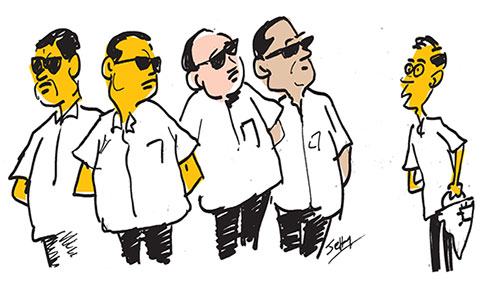
By Lynn Ockersz
The tax owed by him to Caesar,
Leaves our retiree aghast…
How is he to foot this bill,
With the few rupees,
He has scraped together over the months,
In a shrinking savings account,
While the fires in his crumbling hearth,
Come to a sputtering halt?
But in the suave villa next door,
Stands a hulk in shiny black and white,
Over a Member of the August House,
Keeping an eagle eye,
Lest the Rep of great renown,
Be besieged by petitioners,
Crying out for respite,
From worries in a hand-to-mouth life,
But this thought our retiree horrifies:
Aren’t his hard-earned rupees,
Merely fattening Caesar and his cohorts?









